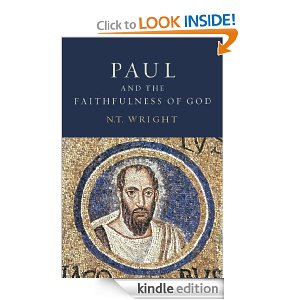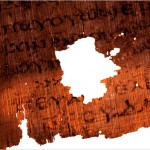Here below is my friend Larry Hurtado’s assessment of Wright’s assessment of Paul’s future eschatology as discussed in Paul and the Faithfulness of God. See what you think.
BW3
—-
Paul’s Eschatology: Further Comments on Wright’s New Opus
by larryhurtado
Ok, here’s what I think is my final blog on Tom Wright’s huge (2-fol) opus, Paul and the Faithfulness of God. In earlier postings, I’ve engaged questions about his treatment of Paul’s Christology here and here, and questions about his view of Paul’s “reworked” view of Israel and God’s people here. In this posting, I engage Wright’s treatment of Paul’s eschatology, i.e., Paul’s view of the future and outcome of God’s redemptive plans. I’m afraid that, again, I have to lodge some complaints.
In Wright’s opus, this topic is discussed mainly in Chapter 11: “God’s Future for the World, Freshly Imagined” (2: 1043-1266). So, a monograph-length discussion in its own right. One thing to note straightaway, however, is that Wright gives a good 130 pages of this chapter to further articulation of his view of Paul’s “reworked” notion of Israel’s election, including ca. 100 pages of Wright’s curiously-ordered discussion of Romans 9–11, some 22 pages of this material given to Romans 11:25-27 alone! So, what is actually devoted to Paul’s eschatology in specifics isn’t nearly as much as might at first appear.
We do have Wright emphasizing correctly that for Paul God’s eschatological programme had already begun in Jesus, especially in Jesus’ death and resurrection. So, to use terms familiar in the history of NT scholarship, Paul held an “inaugurated eschatology,” the final events already underway, the programme to be consummated at Jesus’ parousia (return). (I still like Oscar Cullmann’s analogy: For Paul, Jesus’ death and resurrection was D-Day, and his parousia V-Day, and Paul thinks he is living in the exciting time between these two events: Christ and Time, pp. 144-74, esp 145. )
Also, Wright links (again correctly) the Spirit with eschatology, and so the presence and experience of the Spirit in early Christian circles was for Paul evidence of the new age underway, the Spirit raising new possibilities, new energies for obedience to God, even among former pagans. (Although Wright seems strangely nervous about “experience,” typically putting it in scare-quotes.)
Wright is well-known (notorious?) among NT scholars for railing against those he accuses of positing some future “end of the space-time universe,” and in this work readers looking for that emphasis won’t be disappointed! (I can’t recall anyone other than Wright, however, actually using this expression, and I fear that it’s more a caricature than a fair description of views with which he apparently disagrees.)
But, curiously, we don’t get much about such things as Jesus’ parousia/return (mentioned, but not really engaged), resurrection of the dead (Paul believed it, but little else), final judgement (same here), the glorification of believers (same again), etc. That is, as to the specific phenomena that seem to me to have a significance place in Paul’s eschatological expectations, there is surprisingly little to be found in Wright’s discussion. This is doubly surprising in a work of 2 vols, and over 1600 pages length. Hardly, one thinks, could one offer as excuse a concern to economize on space!
But, although Wright wants to read all “apocalyptic” language as symbols, essentially representing political developments (of this world), clearly (or so it seems to me), a world in which the dead are in any sense “raised” in glorified and immortal bodily existence is unlike anything we know now. So, this would seem to require some rather radical “reworking” of what we know as the world, at the very least! It can’t all be read as “political” developments. So, why so little discussion of these matters?
I could offer my suspicions, but that would be to go beyond fair engagement, and descend to ad hominem commentary. I will simply note here that the handling of Paul’s eschatology seems to me not really adequate at all. The chapter seems more to be a further opportunity for Wright to reiterate points made in earlier parts of the work, especially (the topic that seems to draw his interest and consequently space in the book more than any other) his emphasis on Paul’s “reworked” notion of Israel’s election. But, precisely if we wish to engage Paul’s beliefs in historical terms, it will be necessary to take seriously (and even empathetically) what seem to me to be central beliefs about how God’s redemptive purposes will be consummated.














